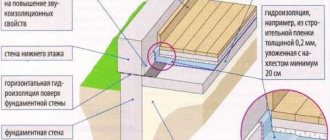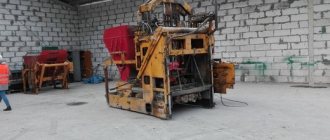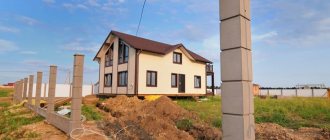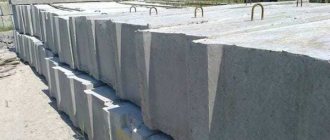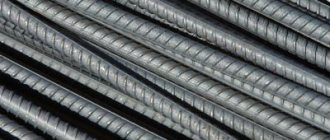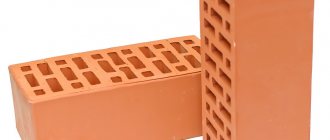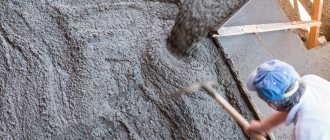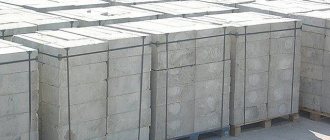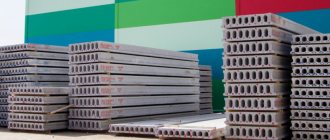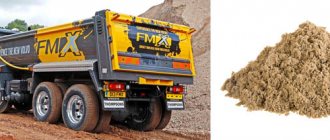The weight of aerated blocks depends on the size, density and amount of moisture in it. For example, a D400 block (600x300x250) weighs about 21 kg when dry, and when wet the weight can reach up to 23 kg.
It is worth noting that blocks of greater height are more appropriate, since the wall is erected faster, the amount of masonry glue is used less, and there are also fewer cold bridges. But a 30 cm high block is 50% heavier than a 20 cm block.
Common sizes of aerated blocks
Aerated concrete blocks are most often made 60 cm long and 20 to 30 cm high. But the variety of block sizes is very large. The most common sizes are: 600x200x300 mm, 600x250x250. Such blocks have convenient dimensions and a permissible weight, which is suitable for laying with the efforts of one person.
If a gas block weighing 20 kg can be lifted and placed without problems, then a block weighing 40 kg, without good physical training, is already problematic. So, if you are planning to build a house alone, take into account the weight of the blocks, otherwise you will break your back and your house will be completed by another guy.
Let us note one more fact - the lower the density of aerated concrete, the more moisture it can absorb.
Next, we will look at four tables that show the approximate weights of gas blocks of various densities (D300, D400, D500, D600). It is also worth noting that these values are suitable specifically for the dry state of aerated blocks; wet blocks weigh several kilograms more.
Installation of foundation blocks
Foundation blocks are mounted on 3 types of base.
- Prefabricated strip foundation slabs These slabs are marked with the FL index and, together with the wall blocks, are elements of a prefabricated foundation. Foundation slabs are laid on a flat, compacted base with waterproofing.
- Monolithic A monolithic concrete pad with a thickness of at least 300 mm is made over a compacted soil surface with compacted sand or crushed stone. In the case of reinforcement, it performs the function of belting rigidity. This cushion can be wider than the FBS blocks and act as a widened strip foundation.
- Crushed stone-sand base Foundation blocks are mounted on a compacted layer of sand or crushed stone 8-10 cm thick. Before installation, the compacted surface is spilled with bitumen to provide horizontal waterproofing of the block.
FBS are laid on cement-sand mortar or concrete. Vertical joints are filled with concrete. For more reliable embedding of FSok joints, their ends are made with recesses for installing concrete locks. To install the FBS, a truck crane and a team of 5 people are required. This is for practical reasons; perhaps the process technology requires more workers. The fact is that to lay the foundation block you need to make a volumetric bed of mortar or concrete. Even with a slight distance of the mixture from the installation site, this is hard work. Therefore, while 2 people and a crane are involved in the installation, 3 or more workers are performing a layer of mortar or concrete under the next foundation block.
The seams between the blocks are made up to 40 mm wide. To ensure the installation of seams, the length and height of the blocks are 20 mm less than the design one. After assembling the foundation wall and embedding the locks, it is made from coating or pasting materials.
In addition to assortments of materials, we have .
Today, FBS blocks are very popular in the construction of foundations and low structures: product sizes and prices are available in a wide range. This allows you to determine the appropriate material for construction in certain conditions. By following the rules for selecting the type of material and its dimensions, you can create a strong and reliable structure in a short period of time.
The concrete block for the FBS foundation is a solid monolithic product made of reinforced concrete, having the shape of a parallelepiped. Among other types of blocks, the material has the highest strength and performance characteristics, thanks to which it can be used in the construction of foundations.
FBS is a reliable, stable and durable building material, which is characterized by increased resistance to environmental influences. The strength characteristics of the product are of particular importance, since the elements are the basis for creating the foundation of the building.
The material is manufactured exclusively in factory conditions, since the quality of each product must be strictly controlled using laboratory instruments in accordance with GOST. Foundation blocks can be made from the following materials:
- silicate concrete or expanded clay concrete with a density of at least 1800 kg/m³;
- lightweight high-strength concrete class B100;
- heavy high-strength concrete grade M50-M200.
Concrete is selected based on the operating conditions of the structure being built. This takes into account temperature changes, mechanical loads and humidity levels. Concrete grade M200 has maximum strength. For harsh operating conditions, you can use filler brand M150, and for standard conditions - M100.
In addition to filler concrete, reinforcement made of A1 or A111 steel is used, which improves strength characteristics and reduces the effects of pressure and compression, and plasticizers, which increase the frost resistance of the material.
Why do you need to know the weight of the slabs?
The disadvantage of blocks is that their installation process is quite complicated
FBS is used for installing the foundation and erecting walls. Their main advantage is that these structures arrive at the construction site in finished form, so there is no need to waste time on concrete achieving the required strength. This speeds up the work significantly.
In the manufacture of these building elements, special technologies are used: drying or steaming of products in a factory, this provides the blocks with a standard degree of hardness, frost resistance and compressive strength. To protect the slabs from the aggressive action of atmospheric and groundwater, they are covered with a bitumen-based waterproofing layer.
The weight of the slabs depends on the size of the products and the brand of concrete that was used in their manufacture, plus the amount of reinforcement. It affects the quality and strength of the base. You can find out by using the assortment.
Having determined how much the blocks weigh, builders can calculate how much equipment is needed for their delivery and installation, as well as calculate the load that the FBS foundation can withstand.
Of course, it is advisable to entrust the calculation of the foundation to professionals, but you can also use an online calculator for these purposes. To independently calculate the number of foundation blocks, you need to divide the volume of the foundation by the volume of one block. After this, select the dimensions of the FBS, which, when summed up, are equal to the size of the foundation.
The type of mortar from which the slab is made, as well as the presence of voids in it, reduces the permissible load on this block. If all calculations are made correctly, then as a result of construction work the owners will receive a stable and durable foundation.
The dimensions of the slab and the grade of concrete also affect the mass of the block. Having found out how much the product weighs (by weighing this building element), you can calculate its density and compare it with the declared density of the plant. This way you can protect yourself from counterfeiting.
It is preferable to buy certified products from well-known brands that have proven themselves in the construction market. If there is no quality certificate for a building material, it is better to refuse it, because it is unknown what technical characteristics it has.
Foundation blocks are a piece of building material with which you can quickly assemble a reliable and durable foundation for any building, lay down the basement and basement, and the walls of an underground structure. One of the most popular types is FBS 24-4-6. More often they are made of heavy concrete, but GOST 13579-78 also allows for the production of prefabricated foundation elements from dense silicate or with the addition of expanded clay.
Main types:
- To produce FBS 24-4-6, heavy concrete of classes B7.5-B12.5 with a density of 2300-2500 kg/m 3 must be used, but today plants also offer stronger blocks - up to B22.5. Products traditionally come with internal reinforcement and sling loops. As a result, the weight reaches 1300 kg. All elements are marked with the letter “t” or simply come with numeric indices by default.
- Expanded clay blocks (denoted by the letter “p” at the end of the entry) have the same strength indicators, but due to the lighter porous filler, their weight usually does not exceed 980 kg.
- Products made from compacted silicate concrete with a density of 2000 kg/m 3 ended up somewhere in the middle - 1.09 tons. At the same time, the compression class of the material here is quite high (B15-B20).
Foundation blocks at all factories are produced using approximately the same technology. The only difference can be in the chosen method of hardening the fill. There are two options: natural drying for the required 28 days or steaming. In the second case, FBS gains up to 70% of the standard strength within 24 hours, and then hydration occurs under normal conditions while maintaining the required level of humidity in the concrete.
Check the date and method of production of the batch or ask the seller how many days the concrete products were left to gain strength. According to GOST, all products can go on sale as soon as their compression resistance reaches 50% of the declared values. The exception is heavy blocks, starting from class B12.5 - they must have time to purchase 70%, and silicate concrete - all 100.
FBS 2400x600x400 foundation blocks can be made from different materials. But since heavy reinforced concrete products remain the most common, we will consider the characteristics only for them:
- The weight of one block with a volume of 0.552 m 3 is 1270-1300 kg.
- Compressive strength - 100-350 kgf/cm 2 (it is possible to manufacture lighter products of class not lower than B3.5, that is, with a load-bearing capacity of 50 kgf/cm 2).
- Water resistance – W2-W4.
- Frost resistance – F50-F100.
- Operating temperature range -70 – +50 °C.
- The weight of the fittings is 1.46 kg.
The standard size of blocks is not 2400x600x400 mm, but 2380x580x400 - in the marking the values are rounded to the nearest decimeter. GOST also allows an error in length within ±13 mm, in height/width – up to ±8 mm. Therefore, the gap between the actual and declared dimensions sometimes increases or approaches the nominal values.
From manufacturers you can buy foundation wall blocks with different quality side surfaces: for painting (category A3), tiling (A5) or without any further finishing (A6 and A7). Special grooves are always left on the “butt” side, into which cement mortar is placed during installation.
Application
Most often, 24-4-6 blocks are used for the construction of prefabricated strip foundations. If there is special equipment and the possibility of its access to the site, this technology allows you to complete the zero cycle faster than when pouring a monolith into formwork and waiting for it to mature. This is a good solution if work is carried out in moisture-saturated soils, since ready-made concrete products are sufficiently waterproof.
Dimensions 2400x600x400 mm allow you to get a tape of standard width. This is sufficient for shallow foundations and interior walls of basements, as well as for light buildings. But in the case of load-bearing structures and if it is necessary to fill a wide tape, it is better to choose FBS 24-6-6. The length also turns out to be convenient for the construction of any objects. With dimensions of 2.4 m it is possible to obtain a minimum number of vertical seams.
Foundation wall blocks are used not only for the construction of foundations - they are suitable for the construction of any underground structures and technical premises. Their high characteristics make it possible to use FBS as a material for the construction of unheated industrial facilities, road and site fencing. The only restriction on the use of blocks is related only to the seismicity of the site - it should not exceed 8 points.
Block cost
| Manufacturer (supplier) | Concrete grade | Price per piece, rubles | Cost with delivery |
| BetonMix | M350 | 1900 | 2600 |
| DSK-Stolitsa | M300 | 2400 | 3000 |
| BetMet Trade | M300 | 2700 | 3500 |
| ZhBI-Center | M250 | 1700 | 1900 |
| Concrete goods 24/7 | M300 | 2100 | payment for the flight |
| RusGradStroy | M300 | 2250 |
Other types of FBS are more difficult to purchase; they are manufactured in small batches to order.
- Expanded clay block with dimensions 2400x600x400 mm can be purchased for 1680.
- Silicate 24-4-6c for the foundation will cost 100 rubles more.
Used products are usually not inferior in price and quality to new ones. Blocks for reuse can be found for 1300-1700 rubles. The main thing is that there are no large cracks or exposed reinforcement on the surface. For such reinforced concrete products, deviations in dimensions from standard ones are not standardized. And if width matters, it is better to take FBS 24-6-6 - there will be enough stock so that possible chips will not create problems during subsequent construction.
When choosing a material for building a house, you should focus not only on cost, but also on the characteristics that determine its quality: weight, density, frost resistance and water absorption.
The weight of any material, including the weight of a foam block 600x300x200, depends on the fillers. Concrete blocks come in different types and have their own characteristics.
Scope of application of blocks
Block structures can be divided into two large groups:
- masonry (or wall);
- foundation.
The lightest building block is often used to build interior walls. It is made from foam or aerated concrete, and can also be expanded clay concrete, wood concrete, or porous ceramic.
Massive blocks are indispensable when laying the foundation of a building. Their strength and ability to withstand the heaviest load largely determines the weight of the concrete block, as well as the composition of the material from which it is made.
Innovations introduced into production have made the quality of block foundations no worse than the well-known monolithic ones. But the work moves much faster, installation is simplified, and costs are reduced. In addition, they are suitable for use in different climatic zones and geological conditions.
In addition to foundations, concrete blocks have proven their effectiveness in construction and installation:
- multi-storey buildings;
- non-residential construction projects,
- various fencing,
- various partitions and ceilings.
Advantages and disadvantages of foundation reinforced concrete blocks
Due to its high strength and performance characteristics, this concrete building material, which is reinforced from the inside with a reinforcement frame, can be used for the construction of a columnar foundation, in combination with a strip foundation, for the construction of walls of low buildings, basements and cellars.
Concrete foundation blocks are characterized by the following advantages:
- good load-bearing capacity;
- high installation speed;
- reliability of the material, this is ensured due to the fact that the products are manufactured in the factory using special technology on modern equipment, in addition, they undergo strict laboratory control;
- high density of joining of elements, which is achieved thanks to the thoughtful design of products and the precise dimensions of concrete blocks;
- the elements are equipped with special mounting grooves for convenient installation;
- the versatility of the material makes it possible to construct the foundations of structures of any complexity;
- installation work can be carried out at any time of the year, since the material is not afraid of temperature fluctuations and high humidity;
- the high stress resistance of the material allows it to be used in the most unfavorable conditions, such as icy or acidic soils;
- After completing the installation of the blocks, you can immediately begin other construction work.
The disadvantages of the material include:
- high cost of products;
- low heat resistance;
- the large weight of the products, as a result of which installation work associated with laying the elements will require the use of special equipment;
- the joints between the parts will not be leak-tight.
Reliable domestic manufacturers of foundation blocks: product prices
FBS concrete blocks are part of the products that are produced at any concrete plant. Very often, products are manufactured without observing all the details and stages of the technological process. Mixed grades of concrete can be used as raw materials. Therefore, when choosing a high-quality and reliable material, you should choose companies that have proven themselves to be the best in the global construction market.
One of the largest enterprises in Russia for the production of building materials from concrete is the Plant of Industrial Construction Parts. The products are durable and of high quality, which is carried out in accordance with GOST requirements. The cost of foundation blocks starts from 1200 rubles/piece.
The Russian company specializes in the manufacture of concrete products. The product range includes more than 400 items, including wall foundation blocks. The price per piece of the product depends on its dimensions and averages 1,650 rubles.
Another popular domestic manufacturer is. It produces all types of concrete blocks, the price of which depends on the type of product and starts from 1150 rubles/piece.
The Alexandria expanded clay plant produces various types of concrete products. Small concrete blocks are in great demand, which can be used in the construction of load-bearing walls, fences and columns, or used as supporting elements in basements and semi-basements, and ground floors. The products are made in special shapes, due to which they have precise dimensions. The price of foundation blocks 200x200x400 mm starts from 55 rubles/piece.
Another reliable manufacturer is the Zlatoust plant, which produces a wide range of FBS, FBP, FVP, stairs, panels, lintels and concrete road slabs. The products are reasonably priced. The price of a foundation FBS block starts from 950 rubles/piece.
Depending on density
The weight of any building material depends on its fillers, which in turn determine the density value. Sand and fly ash play the role of filler. The latter is a finely dispersed element; sand is denser, so its presence in a larger volume determines the overall density of acrete concrete.
Specific gravity is denoted by the Latin letter D followed by a number indicating the number of kilograms of concrete in one cubic meter.
Lightweight qualities are not the main characteristics for which building materials are valued. Its main goal is to provide maximum thermal insulation while maintaining the required strength of the entire erected structure.
The higher the specific gravity, the greater the strength and thermal conductivity. And if the ability not to succumb to destruction is not superfluous, then a high coefficient of thermal conductivity reduces the function of a building material to retain heat. Therefore, when choosing, you need to focus on all indicators and look for a compromise.
Often during construction, foam blocks with a specific gravity of D 600-D 700 are used as a structural and thermal insulation building material.
We can confidently state the fact that density is an important quantitative characteristic of the structure of lightweight cellular concrete, which determines its technical properties, including the weight of the foam block 600x300x200.
| Brand of foundation block | Weight, t | Foundation block size, mm |
| FBS 24-3-6t | 0,975 | 2380x300x580 |
| FBS 24-4-6t | 1,3 | 2380x400x580 |
| FBS 24-5-6t | 1,63 | 2380x500x580 |
| FBS 24-6-6t | 1,96 | 2380x600x580 |
| FBS 12-3-6t | 0,49 | 1180x300x580 |
| FBS 12-4-6t | 0,64 | 1180x400x580 |
| FBS 12-5-6t | 0,814 | 1180x500x580 |
| FBS 12-6-6t | 0,98 | 1180x600x580 |
| FBS 9-3-6t | 0,326 | 880x300x580 |
| FBS 9-4-6t | 0,468 | 880x400x580 |
| FBS 9-5-6t | 0,51 | 880x500x580 |
| FBS 9-6-6t | 0,7 | 880x600x580 |
| FBS 12-4-3t | 0,31 | 1180x400x280 |
| FBS 12-5-3t | 0,38 | 1180x500x280 |
| FBS 12-6-3t | 0,46 | 1180x600x290 |
